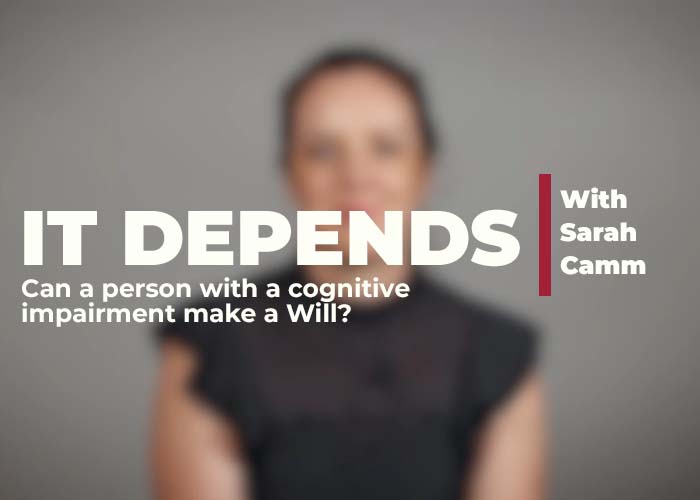In this edition of It depends, associate Sarah Camm discusses whether a person with a cognitive impairment can make a Will.
Video Transcript
Hi, and welcome to this week’s session of It Depends. This week we’ll be talking about issues with capacity, mainly speaking about testamentary capacity.
What does capacity mean?
When we’re talking about capacity, we’re really talking about whether someone has the cognitive ability to enter into a document, whether that’s a contract to sell their property or an enduring power of attorney or a will, for example. Capacity can also affect whether someone can continue in their role as a director of a company or a trustee of a trust. Broadly speaking, to have capacity means you’re able to understand the nature and effect of the decision that you’re being asked to make. The level of understanding and the precise test for capacity is going to depend on the decision that you’re being asked to make, or the document that you’re signing.
What is testamentary capacity?
Testamentary capacity refers specifically to capacity to enter into a will, as opposed to some other decision, like making a contract to sell property or signing an enduring power of attorney. A person who is over the age of 18, will have testamentary capacity if they understand the nature of making a will, they understand the extent of their property, they’re able to comprehend the different people who might have a claim on their estate, and they don’t have an illness or disorder of the mind that will affect their ability to weigh the claims of those people who might have an interest in their estate.
Can a person with cognitive impairment make a Will?
It depends. Having dementia or some other illness that affects your cognition can but doesn’t always mean that you will lack testamentary capacity. It will depend on whether that person can still understand the nature of making a will, the extent of their property, and can weigh the different people who might have an interest in their estate.
What happens when a person doesn’t have capacity?
If a person makes a will and there’s a question about whether they had capacity, the will can be challenged in court. If the court finds that the will was invalid, then that person’s estate will be distributed either on intestacy or in accordance with a previous will that they had made, and that was valid. If there are serious doubts about capacity before a person makes a will, there is the option of applying to the court for a statutory will, which is a will that’s authorized by the court to be made on behalf of that person that doesn’t have capacity. The court will need to be satisfied that the terms of the will, that they’re approving, are the terms of the will that the person would have made if they had capacity to do so. Whether or not a person has capacity is a really complex issue. It depends on the type of decision that’s being made, the time that the decision is being made, and the precise subject matter of that decision. The consequences for signing documents, where there is no evidence about capacity and questions about capacity come up later on, can be really wide reaching. It is important that advisers and clients are considering capacity in all transactions.
If you have a matter that you’d like to discuss, contact one of our private clients team members today or come along to our Annual Adviser Conference in March 2025, where we’ll be discussing this issue in much more detail.





